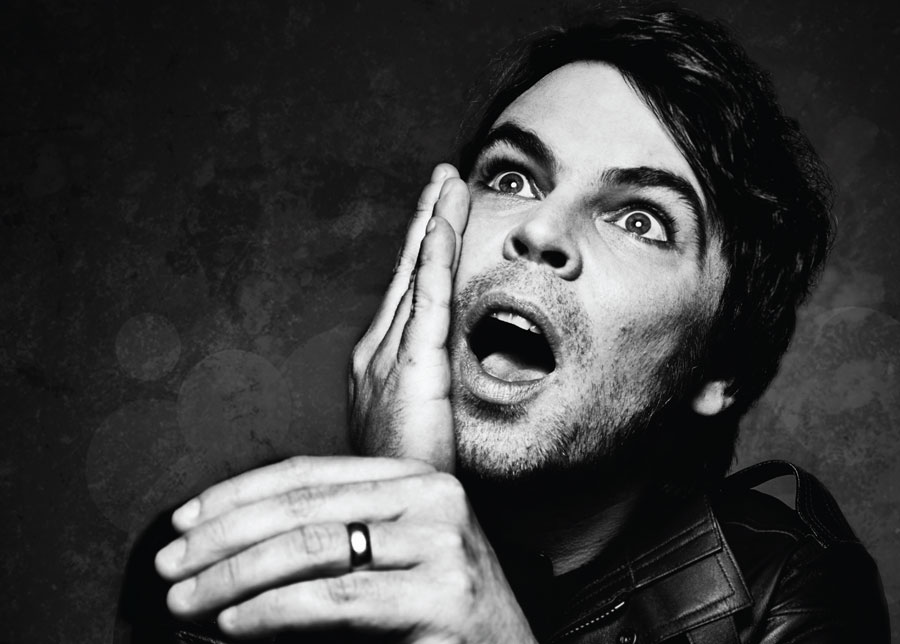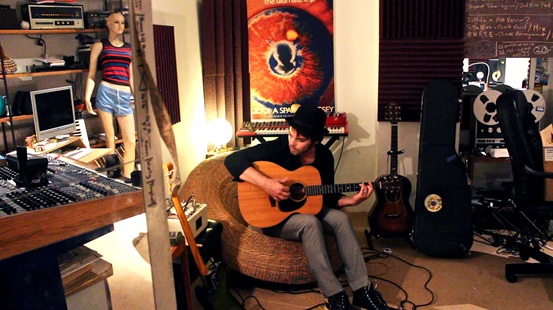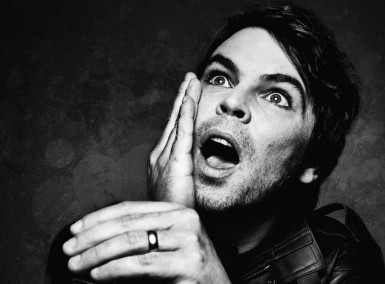
In the new year, coming a long way from his Brit-pop days, the ex-frontman of SUPERGRASS will be releasing his second solo album, Matador, on January the 26th. After the glowing reviews of his debut work, Here Comes The Bombs, there has already been excitement at the prospect of his second release. GAZ COOMBES has been playing the circuit over the summer and is set to go on tour again with Matador in February. NOTHING BUT HOPE AND PASSION caught up with COOMBES to hear about his hopes for the new release and the joys of writing solo records.
Have you already heard a bit of excitement about the new album?
It’s quite strange actually, there is a lot of excitement. I’m keeping my expectations at a realistic level but it is really exciting, the feedback so far, from people who’ve heard the record. The band is playing really well and the new stuff has come together live in a brilliant way. So it’s all there for the taking.
There’s a bit of a change in vibe from the titles of ‘Here Come the Bombs’ and ‘Matador’ – why the change?
The albums have a very different vibe. They are all unique snapshots of my life and there is no real continuation thematically. It’s just where the music is and lyrically where I am on this record, it’s a very different album.
Did you think it was an easy transition from your debut solo to this one? Or was there a lot of pressure about making a good second release?
No, actually I didn’t think about that. I think it would have been kind of stifling to be in that headspace. I guess I started writing pretty quickly off the back of the first album, that’s just what I do. I don’t stop writing just because I’m on tour so the writing did come out kind of quickly from the first record. But similar to the first record, it was only after I had written the first few tracks and recorded them that I realised I was onto something good.
Equally, all the way through the record it is always, to a degree, a stream of consciousness and you don’t know how it’s all going to tie together. To me there’s no point second-guessing myself, whether or not people will like it. I’ve just got to get the ideas out in a very honest way. I definitely feel that I did that and it’s been a brilliant experience.
In an interview for your last album, you said that Absurdist philosophy helped your album come together. Were there any non-musical influences on this latest record?
I guess I’m into the broad, brush-strokes of light and dark, of love and loss. I find the contradictory side of life fascinating. The music could be telling you one thing and the lyrics are telling you another. There can be a juxtaposition of a joyous series of chords but lyrically you’re questioning and letting things out. It’s the starting point of any writing to get those feelings out and then the focus comes through the writing.
How is the touring experience different solo than with a group? Do you enjoy it?
It’s been amazing. I wouldn’t still be doing it if it wasn’t both a lot of fun and really rewarding. I’m lucky to have a great band around me at the moment, they work really hard and I work them really hard during rehearsals. A part of me has changed quite a lot. I’m pushing things a lot harder now to get the results that I want to hear. I want to do these shows to really get across how much I believe in the music. I’m lucky to have the band I have who can make that happen for me. The gigs have been amazing; I guess the future looks very exciting.
When you toured with your debut solo album, you performed at a couple of churches. Why did you pick these venues? Was it difficult to get a performance there?
There was a bit of arm-twisting to get some of the venues. But most of them were on the circuit and bands were playing at those venues. I wanted to experiment with the sound of the room. These cathedral-like surroundings allowed things to resonate in different ways, the acoustics are so unique. With the new songs I was writing, I was really interested to hear what they would sound like in that environment. I would be getting the natural reverb of the church. It all led up to the Union Chapel gig in London that I played and that was something I scratched off my bucket list. It was a really special night. In February I will be back to a club tour; there I love the closeness, the intimacy and all the sweat, the fans standing up at the front. Equally I’m really excited about that tour.

Do you see new fans coming to your album? Or are there a lot of fans of your older work?
I think there’s a bit of both. There are lots of new fans, a lot of people come up who say they didn’t know SUPERGRASS but they really like my record. That makes me feel good because although I’m really proud of everything I did with SUPERGRASS I’m not going to live off that, sit on that legacy and think everything will come to me. I’m about starting again and fan-bases grow from almost nothing.
To get around the people who came over from SUPERGRASS is brilliant; it’s really satisfying. There were a couple of guys at a gig the other night who came to a show because they thought it was ‘GAZ COOMBES: SUPERGRASS.’ They had no idea what any of my solo stuff was like but they came up to me at the end and said it was brilliant and they’ll be buying the record.
From intimate venues to clubs, do you actively change what you play or does the music of the venue adapt your music?
It adapts to anything. The church shows that I did, there were only three of us. It was less important to make a really big, heavy distorted sound. It would sound really messy in a church, you need to be a bit more delicate. But in clubs I change set and have a more high impact moment. The audience will be standing up and there are more moments when they can get their dancing shoes on. You know, I take each gig as they come.
Why did you decide to record a lot of your album from your home studio?
I find residential, closed studios a bit too easy with all the sounds ready to go. Not enough mistakes are made. There are always great microphones but it’s kind of easy. At home, it’s a good little studio but it’s pretty limiting. Working with limitations, I find I’m getting a song together and after about five minutes I think fuck it. I just want to get the ideas down; I’m not going to spend three hours working on the sound.
For that reason, I really love how this record sounds. It feels really close to my heart, or close to my approach with recording. I like bits of low-fi, I like mistakes, I like the natural performance. All those first takes just get ironed out in a pro-studio, it loses a bit of soul.
What does hope and passion mean to you?
Hope can be a dangerous thing but it’s what keeps you going. The hope that your kids will be happy and healthy or the hope that you’ll have a fulfilled life. And passion creeps into everything. Whether it’s a conversation down the pub or an album that you’re making, passion is the key to it. You’ve got to be passionate about everything.
—
